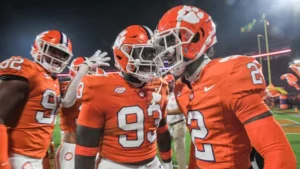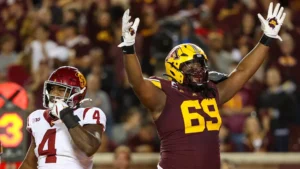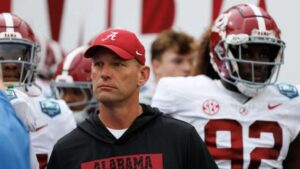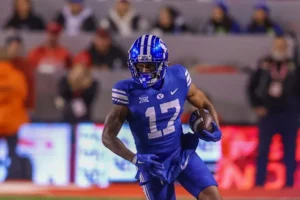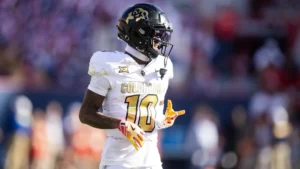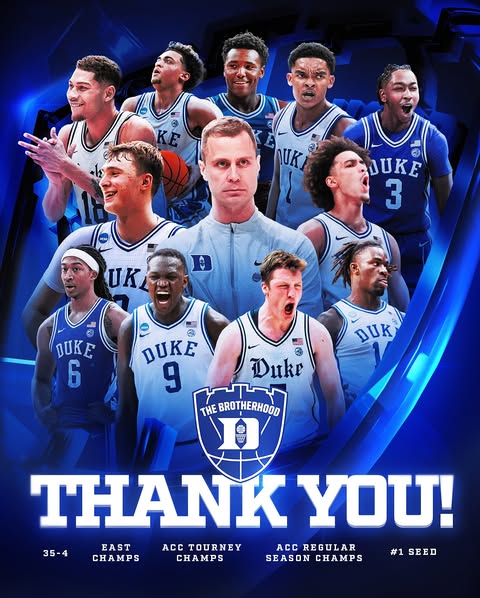
Shout Out to a Squad That Repped Duke Basketball at the Highest Level
When you think about college basketball royalty, you can’t get very far before Duke University comes up. The Blue Devils aren’t just a team — they’re a standard. A legacy. A dynasty. And over the decades, we’ve seen some iconic squads suit up in royal blue and white, defending Cameron Indoor Stadium with pride and passion. But one squad stands out — a team that embodied everything Duke Basketball is about: skill, grit, IQ, chemistry, and an unwavering will to win.
This is a shout out to the 2000-2001 Duke Blue Devils. A squad that didn’t just rep Duke — they defined it.
Context: The Legacy and the Pressure
By the year 2000, Duke was already elite. Mike Krzyzewski, or Coach K as the basketball world affectionately knows him, had built something extraordinary in Durham. Three national championships in the ’90s, countless ACC titles, and a reputation for developing not just NBA talent, but winners. That was the bar.
So when the 2000-01 season rolled around, the expectations were sky high. The previous season had ended in heartbreak — a loss to Florida in the Sweet 16. For most programs, that’s a solid run. For Duke? Unfinished business.
This team was on a mission.
The Roster: A Squad Built for the Moment
What made the 2000-01 Duke squad so legendary wasn’t just their talent — it was how their individual pieces came together to form something special. Let’s break down the key players, because every member of that rotation brought something unique to the table.
Shane Battier – The Soul and the Shield
Captain. Leader. Lockdown defender. Shane Battier was the heartbeat of this team. A senior and three-time NABC Defensive Player of the Year, Battier was the rare player who could dominate a game without scoring a point — but often dropped 20+ while doing all the intangibles.
Battier’s game was cerebral. He was the guy who would take a charge on one end, hit a dagger three on the other, and then dive for a loose ball in the next possession. He was Coach K’s extension on the court, and his leadership set the tone. He ended up winning the Naismith and Wooden Awards that season — college basketball’s highest individual honors.
Jason Williams – The Engine
Jason “Jay” Williams was electric. A sophomore point guard with NBA-level explosiveness and craft, he was the perfect complement to Battier. Williams averaged over 21 points per game that season and ran the show with flair, vision, and relentless aggression.
He could shoot from deep, finish in traffic, and put a defense on skates. But what made Jay Williams truly elite was his feel for the game. He wasn’t just fast — he was smart. His pick-and-roll game was surgical, and when he turned it on, few teams in the nation could keep up.
Mike Dunleavy Jr. – The X-Factor
Don’t let the quiet demeanor fool you — Mike Dunleavy Jr. was cold-blooded. The 6’9″ sophomore was a matchup nightmare. He could shoot the lights out, handle the ball, and play multiple positions. His versatility made Duke lethal. Need a corner three? He’s your guy. Need a big rebound? He’s there. Need someone to score 21 points in a half during the national title game? Done.
Dunleavy wasn’t always the focal point, but he was the spark plug. When he got hot, it changed the entire dynamic of the game.
Carlos Boozer – The Anchor
Before he became an NBA All-Star, Carlos Boozer was the big man down low for the Blue Devils. At 6’9″, 260 pounds, Boozer brought power, poise, and polish. He had soft hands, a strong post game, and wasn’t afraid to bang inside. His rebounding was crucial, and he gave Duke a true inside threat to balance their perimeter firepower.
And let’s not forget — Boozer came back from a broken foot in the middle of the NCAA Tournament to help seal the title. That’s toughness you can’t teach.
Chris Duhon – The Glue Guy
As a freshman, Chris Duhon could’ve just played his role and watched the veterans lead. But instead, he became a critical cog in Duke’s machine. A defensive menace, a heady passer, and a relentless floor general, Duhon gave Duke 20+ minutes a night of stability, defense, and smart play.
He was often the one picking up full court, pushing tempo, and making the unselfish extra pass. The kind of player every great team needs.
The Bench Mob
Let’s not sleep on the role players. Nate James brought veteran savvy and toughness. Casey Sanders gave rim protection and energy. Matt Christensen, Reggie Love — they all played roles that, while not always flashy, were necessary. They held each other accountable and played for each other.
The Season: Domination and Adversity
Duke opened the season ranked No. 2 in the country and quickly showed why. They ripped through their non-conference schedule, taking down top teams with a mix of style and substance. Their offense was ahead of its time — spacing, ball movement, and tempo that would look right at home in today’s NBA.
They went 13-3 in ACC play, won the regular season title, and captured the ACC Tournament Championship. But it wasn’t all smooth sailing. Boozer’s mid-season injury could’ve derailed them. They had some close calls. But every time they were tested, they responded.
The team’s resilience became its identity. They weren’t just winning — they were surviving, adapting, and finding new ways to impose their will.
The NCAA Tournament: Cutting Down Nets
March Madness. The big dance. This is where legacies are made — and Duke danced all the way to the top.
-
In the Sweet 16, they took down UCLA.
-
In the Elite Eight, they met and outlasted a scrappy USC squad.
-
The Final Four matchup? Maryland — an ACC rival who had already beaten Duke that season. Maryland came out swinging, taking a 22-point lead in the first half.
And then? Duke flipped the switch.
Behind Williams, Battier, and a never-say-die attitude, Duke stormed back and won the game. That comeback is one of the most iconic in tournament history. Pure heart.
In the national championship game, they faced Arizona — a squad loaded with NBA talent like Gilbert Arenas, Richard Jefferson, and Loren Woods. It was supposed to be a battle. Instead, it was a coronation.
Dunleavy went off. Battier locked in. Williams orchestrated. Boozer battled. Final score: 82-72. Duke was back on top.
The Legacy: Why This Squad Was Different
There have been other great Duke teams. The ’91 and ’92 back-to-back champs. The ’98-99 team with Elton Brand. The 2010 and 2015 title runs. But the 2001 squad? They hit different.
-
They had star power: Battier, Williams, Boozer, Dunleavy — all NBA players.
-
They had coaching: Coach K was at the peak of his powers, balancing development and domination.
-
They had adversity: Boozer’s injury. The Maryland comeback. All tests passed.
-
They had unity: This wasn’t just a group of talented players. It was a team.
And most importantly, they played the Duke way — with intelligence, intensity, and unrelenting belief.
The Impact: Beyond the Hardware
That championship wasn’t just a win for the 2001 team — it was a re-establishment of the Duke Basketball brand. It was a declaration that the program wasn’t just surviving the new millennium — it was thriving in it.
That squad inspired a new generation of fans, players, and future Blue Devils. They showed what leadership looks like. What chemistry can do. And how a collective mindset beats individual accolades.
Jay Williams would go on to become one of ESPN’s premier voices. Battier won two NBA titles and became a thought leader on basketball analytics. Boozer and Dunleavy carved out long NBA careers. Duhon became a coach. And Coach K? He only added four more Final Fours and two more titles to his legacy.
But it all started here — with this squad, this season, this mission.

